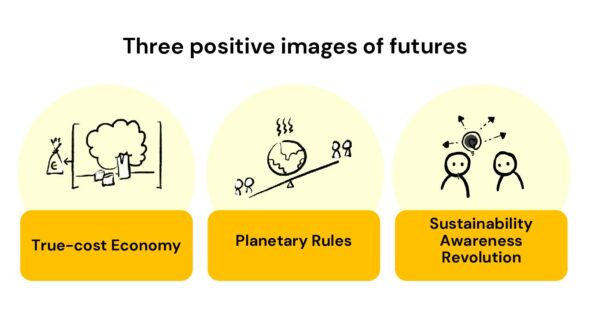15.4.2025

The Finnish Expert Panel for Sustainable Development has developed three outlines of parallel, complementary, positive and realistic images of futures for a sustainable future: The True-cost Economy, Planetary Rules and Sustainability Awareness Revolution. The outlines were created in collaboration with Demos Helsinki to facilitate societal discussion on visioning sustainable futures in Finland. The outlines are based on a comprehensive data analysis and the gaps in the existing images of futures identified in the analysis. Next, the outlines will be developed further as the Finnish Expert Panel for Sustainable Development invites citizens to join the effort.
The three positive images of futures address the gaps in the existing images of futures
In the analysis conducted in collaboration with Demos Helsinki, key gaps in existing images of futures were identified: The existing images do not consider changes needed in institutional or economic structures, nor the interdependencies between societal development and technical solutions. Additionally, existing images of futures often consider citizens as users of solutions instead of seeing them as societal influencers driving the sustainability transformation.
The outlines of positive images of futures presented below provide a foundation for envisioning a sustainable future together.
The True-cost Economy outline envisions a transformed economic system. A total cost accounting method is in use; ecological and social harms and benefits are included into the prices of products and services. The new pricing of emissions, natural values, and social harms and benefits eliminates the most harmful solutions from businesses and everyday choices.
The Planetary Rules outline focuses on changes in politics and decision-making. A planetary governance system, based on science, planetary data and citizen panels, regulates overconsumption and restores nature. The system is also responsible for the principles of fair use of natural resources, the monitoring of artificial intelligence and weapon systems, and pandemic prevention. Other matters remain in the hands of national, regional and local bodies.
The Sustainability Awareness Revolution outline examines changes that accelerate the sustainability transformation in civil society. Education and learning strengthen the change of values, which leads people to direct their interests, skills and resources in a way that supports the sustainability transformation. Curricula include system, future and problem-solving skills, as well as training in ethical reflection. New sustainability-promoting professions are introduced to the labour market, including, for instance, solution teacher, futures facilitator, supervisor of ethical reflections and greed challenger.
The majority of people prefers a sustainable future
Studies have shown that most people prefer a socially and ecologically sustainable future over an individualistic world of ever-tightening competition and overconsumption of natural resources. Envisioning the future is often challenging, but images of futures help us to vision and pursue a just and desirable sustainability transformation. Sustainable future is construed in the present.
Next, the Finnish Expert Panel for Sustainable Development invites everyone to visit the room of future, where it is possible to experience and imagine what a sustainable future is like and how it looks and feels. “Room 2050”, organised in collaboration with the Falay Transition Design collective, will be open at the Helsinki Central Library Oodi from Sunday to Monday, 25th–26th May.
The database gathered for and used in the analysis.
For more information, see: Discussion entry 1/2025 by the Finnish Expert Panel for Sustainable Development
